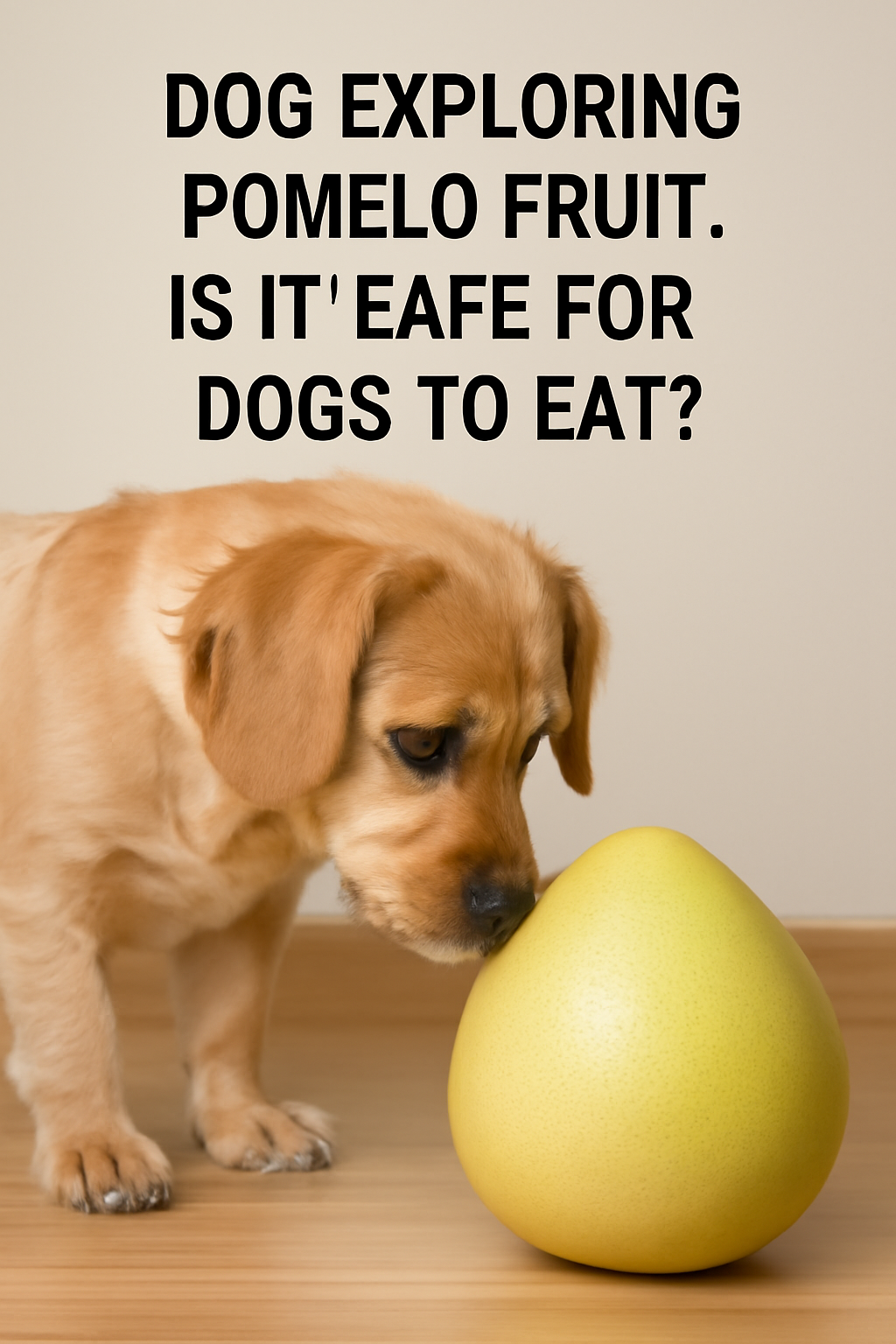Introduction 🍊🐶
As pet owners, we always want the best for our furry friends, especially when it comes to their diet. Healthy treats can boost their well-being, but it’s essential to ensure that the snacks we give are safe and nutritious. Fruit can be a great addition to your dog’s diet, but some fruits are better than others. One fruit that may spark curiosity is the pomelo. Known for its large size, sweet flavor, and thick rind, pomelo is related to other citrus fruits, like grapefruit.
You might be wondering: Can dogs eat pomelo? Well, the short answer is yes, but with some important considerations! In this article, we’ll dive deep into whether pomelo is safe for dogs, its nutritional benefits, the risks involved, and how you can safely feed it to your dog.
Can Dogs Eat Pomelo Safely? 🍋
Before you offer any new food to your dog, it’s crucial to understand how their digestive system works. Dogs, unlike humans, have a different tolerance to various foods, and some fruits, like pomelo, may not always agree with their stomachs. While pomelo isn’t toxic to dogs in small amounts, there are certain aspects that could lead to digestive issues.
Pomelo is a citrus fruit, and like other citrus fruits, it contains high levels of acidity. While humans can easily tolerate these acids, dogs with sensitive stomachs might experience discomfort. Additionally, the peel and seeds of pomelo contain compounds that can harm your dog if consumed.
Let’s break it down further, starting with the nutritional value of pomelo. This will help you understand why it might be good or bad for your dog.
Nutritional Value of Pomelo 🍊
Pomelo is packed with several beneficial nutrients, some of which can be beneficial for your dog. However, as we discussed earlier, moderation is key. Below is a table of the nutritional value of pomelo:
| Nutrient | Amount (per 100g) | Benefits for Dogs |
|---|---|---|
| Calories | 38 kcal | Low-calorie snack for dogs |
| Water Content | 90% | Hydrating and refreshing |
| Vitamin C | 61 mg | Boosts immunity and helps fight infections |
| Potassium | 216 mg | Supports muscle and nerve function |
| Fiber | 1.4 g | Aids digestion and supports a healthy gut |
| Carbohydrates | 9.6 g | Provides a quick energy source (in moderation) |
| Sugars | 7.0 g | Natural sugars, should be consumed in small amounts |
As you can see, pomelo has a high water content, which can help keep your dog hydrated. It’s low in calories and sugar, making it a relatively healthy snack option when served in moderation. The presence of vitamin C can help boost your dog’s immune system, while fiber promotes digestive health.
While these benefits sound great, you also need to keep in mind the risks that come with feeding your dog pomelo. Let’s explore those next.
Risks of Feeding Pomelo to Dogs ⚠️
While pomelo has some nutritional benefits, it also carries certain risks that every pet owner should be aware of. Here’s a breakdown of the potential dangers:
1. Citrus Acidity 🍋
Pomelo belongs to the citrus family, which means it has a high acidity level. This can lead to stomach upset for dogs, particularly those with more sensitive digestive systems. Too much acidity can result in vomiting, diarrhea, or even gastritis. Therefore, it’s important not to overfeed pomelo to your dog.
2. Citrus Oils and Peel 🍊
The peel and rind of pomelo contain essential oils and toxins that can be harmful to dogs. These oils can cause digestive distress, including drooling, vomiting, and even poisoning if consumed in large amounts. Always make sure to remove the peel and any seeds before offering pomelo to your dog.
3. High Sugar Content 🍬
Although pomelo is lower in sugar than some other fruits, it still contains natural sugars. Excess sugar can lead to obesity and diabetes in dogs over time. Always remember that fruit should be a treat, not a main part of your dog’s diet.
4. Choking Hazard 🔴
Another risk comes from the seeds. While the seeds in pomelo aren’t toxic, they can pose a choking hazard, especially for small dogs. Always remove any seeds before giving pomelo to your dog.
5. Potential Allergic Reactions 🤧
Just like humans, dogs can sometimes have allergic reactions to new foods. If it’s your dog’s first time eating pomelo, start with a very small amount and watch for signs of an allergic reaction, such as itchy skin, swelling, or hives. If any symptoms appear, discontinue feeding pomelo and consult your veterinarian.
How to Safely Feed Pomelo to Your Dog 🍴
If you’ve decided that you’d like to give your dog a taste of pomelo, here are some tips to make sure you’re doing so safely:
1. Remove the Peel and Seeds 🍊
Always remove the peel and seeds before offering pomelo to your dog. The peel contains oils that can be harmful, and the seeds can pose a choking hazard.
2. Serve in Small Pieces 🍽️
Cut the pomelo into small, manageable pieces that are easy for your dog to chew. Depending on the size of your dog, you can serve them a few bite-sized pieces.
3. Moderation is Key 🐾
Feed your dog pomelo only in small amounts and as an occasional treat. Don’t let it replace their regular balanced diet. Too much fruit can upset their stomach and lead to digestive issues.
4. Observe for Reactions 👀
After giving your dog pomelo for the first time, watch closely for any signs of discomfort, such as vomiting, diarrhea, or unusual behavior. If any of these symptoms occur, stop feeding pomelo immediately and consult a veterinarian.
Can Pomelo Be Part of a Balanced Diet for Dogs? 🍽️
Pomelo can be part of your dog’s diet occasionally but should not be relied on as a regular food source. Dogs require a balanced diet rich in protein, fats, and essential vitamins. Treats like pomelo can offer some nutritional benefits but should never substitute the main components of a dog’s diet.
For a balanced diet, always prioritize high-quality dog food that meets all of your pet’s nutritional needs. Fruit, including pomelo, should only serve as a special treat and not a staple.
Alternative Dog-Friendly Fruits to Try 🍓🍉
If you’re looking for other fruits to share with your dog, there are several alternatives to pomelo that are safer and more suitable for dogs:
1. Blueberries 🫐
Blueberries are rich in antioxidants and low in sugar. They are an excellent choice for a dog-friendly fruit.
2. Apples 🍏
Apples are packed with fiber and vitamin C. Just make sure to remove the core and seeds, as they contain cyanide, which is toxic to dogs.
3. Watermelon 🍉
Watermelon is hydrating and low in calories. It’s safe for most dogs, but remember to remove the seeds and rind.
4. Bananas 🍌
Bananas are rich in potassium and fiber. They’re a low-calorie fruit that dogs can enjoy in small amounts.
5. Pineapple 🍍
Fresh pineapple is another tropical fruit that dogs can enjoy. It’s rich in vitamins and enzymes that aid in digestion.
These alternatives are typically safer and come with fewer risks compared to pomelo.
Frequently Asked Questions ❓
Can pomelo cause an upset stomach in dogs?
Yes, due to its acidity, pomelo can cause digestive problems like vomiting or diarrhea in some dogs. Always feed it in moderation.
Is pomelo toxic to dogs?
Pomelo itself is not toxic to dogs, but the peel and seeds can be harmful. Never give your dog the peel or seeds.
How much pomelo can I give my dog?
A small, bite-sized piece of pomelo is sufficient. Make sure to remove the peel and seeds, and observe your dog for any reactions.
Can puppies eat pomelo?
It’s best to avoid feeding puppies pomelo due to their sensitive digestive systems. Stick to more puppy-safe fruits like apples or blueberries.
What should I do if my dog eats too much pomelo?
If your dog eats too much pomelo and experiences digestive upset, contact your veterinarian immediately.
Are there any fruits I should avoid giving my dog?
Yes, some fruits like grapes, raisins, and avocados are toxic to dogs and should be avoided entirely.
Conclusion 🐾
Pomelo can be a tasty and refreshing treat for your dog when fed in moderation. With its high water content and vitamin C, it offers some nutritional benefits. However, due to its acidity and the potential hazards associated with the peel and seeds, it’s important to be cautious. Always serve pomelo in small amounts, remove any harmful parts, and monitor your dog for any signs of discomfort.
As with all treats, pomelo should be an occasional indulgence, not a staple in your dog’s diet. If you’re unsure whether pomelo is suitable for your dog, consult with your veterinarian to ensure the best for your pet’s health.




